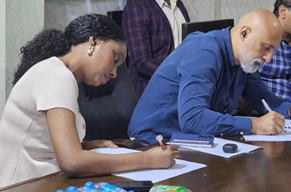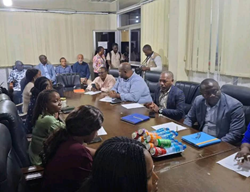By Alvin Lansana Kargbo
The National Civil Registration Authority (NCRA), in collaboration with the National Telecommunications Communications Authority (NaTCA) and Mobile Network Operators (MNOs), has signed a historic Memorandum of Understanding (MOU) and Service Level Agreement (SLA) to formalize the long-anticipated National Identification Number (NIN) and SIM card integration project. The signing ceremony took place at NaTCA’s Headquarters on Hill Station in Freetown, in the presence of regulators, operators and Government representatives.


The NIN-SIM linkage is part of Sierra Leone’s broader digital transformation agenda aimed at enhancing national security, promoting financial transparency and ensuring effective service delivery in the telecommunications sector. The project has been in development since 2018, when NaTCA identified the urgent need to reform subscriber registration processes to combat fraud and strengthen consumer protection.
Following the enactment of revised subscriber registration regulations in 2020, NaTCA worked with MNOs and Parliament to ensure stricter compliance in linking subscriber information to verified identities.
Smart Kokofele, the NIN-SIM integration Project Lead, explained that investigations into criminal activities often revealed weak identification mechanisms, with SIM cards easily acquired without credible proof of residence. This prompted the need to collaborate with NCRA, which holds the most comprehensive citizen database in the country.
Committees comprising NaTCA, NCRA and MNOs were established to design a roadmap, while technical teams ensured that mobile operators could securely access the NCRA database for verification purposes. This system is now fully operational and efforts to raise public awareness about obtaining National ID cards have already resulted in a surge in registrations at NCRA offices nationwide.
Speaking at the ceremony, NCRA Director-General, Mohamed Mubashir Massaquoi, emphasized the importance of the agreements in consolidating Sierra Leone’s digital infrastructure.
“These documents mainly focus on integrating NIN registration with mobile centers. While the regulation existed before, enforcement was weak. Today, we are taking decisive steps to actualize it,” Mohamed Mubashir Massaquoi stated.
He added that linking SIM cards to NINs, aligns Sierra Leone with international best practices, where Governments ensure secure mobile communication systems. The DG highlighted that the initiative would help curb fraud, promote accountability and support mobile-based business transactions.
“By signing this agreement, we ensure that citizens enjoy secure, reliable mobile phone services. It also reflects our commitment to the President’s mandate of enhancing accountability in service delivery,” he said. Mohamed Mubashir Massaquoi further acknowledged the challenges faced by people in remote areas, but assured the public that communication campaigns and service expansion would continue beyond the October 1st compliance deadline.
NaTCA Director-General, Amara Brewah, lauded the technical teams and operators for their perseverance in achieving this milestone.
“The need for individuals to be connected, especially through SIM cards, is essential not only for communication, but also for tackling fraud and financial crimes,” Amara Brewah said.
He explained that linking NINs to SIM cards would allow authorities to track fraudulent telecommunications activities, strengthen national financial systems and enhance confidence in digital transactions.
“This achievement is a result of tireless collaboration among operators, regulators and engineers. I want to thank the CEOs of Orange, Africell and Qcell, whose commitment and flexibility made this possible,” he concluded.
Representatives of Orange, Africell and Qcell hailed the signing of the MOU and SLA as a landmark moment for Sierra Leone’s telecommunications industry. They emphasized that the integration would strengthen national security, improve fintech operations and prepare the sector for the growing demands of technologies; such as the Internet of Things (IoT) and Artificial Intelligence (AI).
“This initiative demonstrates that through consultation and collaboration, we can achieve consensus. Linking SIM cards to NINs is not only about security, but also about streamlining Government processes and ensuring that the telecom sector adapts with technology,” one operator’s representative noted.
The operators further pledged to continue working with regulators to refine the process as technology evolves, ensuring that the framework remains effective and future-proof.
The signing of the MOU and SLA marks a significant leap forward in Sierra Leone’s journey toward digital transformation. With the integration of NIN-SIM data, the Government, regulators and operators aim to enhance national security, foster transparency in mobile transactions and protect citizens against fraud.
As the country braces for the October 1st deadline, the success of the project will depend on continued collaboration, public awareness campaigns and efficient service delivery across both urban and rural areas.